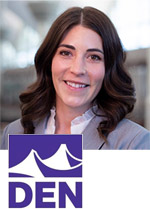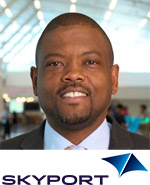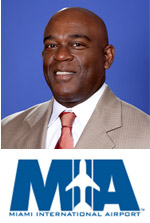9.00 – 9.40 am
An airport CEO role is not for the faint hearted. CEOs are responsible for the mammoth tasks of operating an airport and ensuring a good passenger experience; driving revenue growth; managing operational disruptions and ensuring regulatory compliance, all while safeguarding their airport from external threats and being scrutinised by the press and the surrounding community as the public ‘face’ of the airport.
CEO’s must manage these responsibilities while facing the ever-changing socio-economic environment of the industry’s affairs. Panellists on this keynote will address challenges they have faced in trying to remain financially and socially viable in tough circumstances. In this panel, discuss:
9.40 – 10.00 am
Did you know that the world is expected to reach a total population of 9.8 billion by 2050? According to a United Nations report, 83 million people are being added to the world’s population every year and the world is expected to grow to 6 billion in 2030; 9.8 billion in 2050 and 11.2 billion in 2100. Current projections put global passenger numbers at 19 billion by 2041 – this is double what it is today.
However, the rise in passengers is outpacing the capacity of airports. Airports globally have had to expand terminals because they’re at capacity, however, not all airports are that lucky, and this is why they must work on efficiency and invest in new technologies and digitalisation.
Our speakers in this panel session will discuss how to safely and affordably expand the industry to accommodate growth of the world’s population and airport capacity. Join this session to discuss:

Senior Vice President of Operations, Denver International Airport
10.00 – 10.40 am
Climate change is one of the biggest existential crises for the airport industry and the sector must clean up its act in order to continue to retain its licence to operate. Airports across the globe have faced climate-related issues in the past year, and had to work effectively to remain open and operational. As we continue to experience freak weather events such as extreme heat and drought, and heavy wind, rain and snow, airport infrastructure and operations are put at risk. In this panel, airport leaders debate the controversial question, can airports be sustainable while expanding operations?
Panellists in this talk will leverage their own experience to talk about how to expand operations, while simultaneously lessening environmental impact and meeting capacity needs. In this session, discuss:

Chief Operating Officer, SEA Milan Airports

Director of Airport Operations, Bermuda Skyport Corporation
10.40 – 11.20 am
Airfares are becoming increasingly unaffordable for the average person. Did you know that the price of airfares shot up by 25% in the last year and were 15% higher than in 2019? Reasons for this are multi-faceted; airlines are experiencing higher operational costs, inflationary pressures, geopolitical tensions which are leading to longer flight paths and increased fuel costs. Subsequently, these factors are added onto the prices of plane tickets with passengers bearing the brunt of this.
Despite this, demand remains high and passengers are, paradoxically, willing to fork out money for a plane ticket. Naturally, everyone is asking: ‘when will the demand party end?’ However, in return for higher ticket costs, passengers are now expecting more for their experience because they are paying more – it’s only natural. So, how do airports and airlines move to ensure their loyal passengers continue to feel like they have value for their money? Join the panel session to discuss:

Senior Director Air Service Development & Marketing, Aarhus Airport

Chief Marketing and Passenger Experience Officer, Manohar International Airport Goa
11.20 – 11.50 am
Networking Coffee
11.50 – 12.30 pm
Sustainable aviation fuel (SAF) has been heralded as a ‘silver bullet’ for the aviation industry, the answer to all of the industry’s environmental problems. It’s capacity to be a drop-in technology, and to reduce global emissions by 80% makes it a viable competitor to fuels like fossil kerosene. Because of this many airlines, airports and energy companies have started committing themselves to the investment, production and use of SAF.
Despite being a promising solution, more is required to make the fuel accessible and affordable. Currently new technologies surrounding the fuel make it risky and experimental, leaving many investors unwilling to finance the industry and therefore the production costs remain high. In this session, panellists will discuss:
12.30 – 12.50 pm
As the global aviation landscape continues to evolve, so too do the demographics of air travellers. In 2023, passengers aged 60 plus accounted for 36.93% of travellers; travellers belonging to a family accounted for around 15% and passengers with reduced ability accounted for 1.57% in March 2020. For some airports, passengers with reduced mobility can make up to 3% of their traveller numbers.
As people of different backgrounds travel, they bring with them their own preferences and requirements of how they’d like to travel. Airports are becoming increasingly aware of the need to ensure their airports are inclusive to everyone.
Join us for an insightful discussion as industry leaders and experts delve into the challenges and opportunities associated with meeting the needs of an increasingly varied passenger demographic. In this session, discuss:
12.50 – 1.30 pm
The strategic planning and implementation of air routes play a pivotal role in shaping connectivity, accessibility and economic growth. Given the costs and investments associated with developing and deploying new routes, airports and airlines must have data and knowledge of their markets and be confident that the route will be successful. In this panel session, hear from airline and airport route development teams on how they identify potential new routes, the projected demand and volume, and the competition faced. In this session, discuss:
1.30 – 2.30 pm
Networking Lunch
2.30 – 2.50 pm
The aviation industry is a great enabler of socio-economic growth for local communities and regions. Fostering diversity, equity, and inclusion (DEI) isn’t just a moral imperative; it’s a strategic necessity given the critical role that airports play as hubs of connectivity and gateways to the world, facilitating global travel and commerce. It is crucial that the airport workforce reflects the diverse communities they serve to ensure that all passengers and stakeholders feel welcome, safe, and valued. In this panel session, our speakers will discuss:
2.50 – 3.30 pm
A crucial part of the airport operations ecosystem is baggage handling, and this in turn is central to passenger experience as lost luggage causes huge stress for the traveller. Unfortunately, many airports are working with legacy infrastructure which is slow and outdated, meaning their baggage handling systems are ripe for innovation and new technology. Airports have incorporated baggage innovations to lessen the physical burden that carrying heavy luggage can have on workers while other airports have installed new processing systems that will be able to check every bag at every moment of the journey, from check-in to the aircraft. Gain insights into strategies and best practices for optimising baggage handling operations, improving throughput, and reducing costs to drive overall airport efficiency and performance. In this session, discuss:
3.30 – 3.50 pm
Traditional airports organise in distinctive silos that separate the procurement, management and operations of the network infrastructure. Different stakeholders within the airport ‘own’ each of these systems and work to their individual ends to develop solutions that work within their silos of responsibility. However, this often leads to a fragmented airport experience and the nodes between each part of the passenger journey are not always as smooth as they could be. In order to promote a truly seamless airport experience, each department must be in constant collaboration with each other and always have the passenger at the heart of all their decisions. In this panel discussion, our speakers will discuss:
3.50 – 4.10 pm
Networking Coffee
4.10 – 4.40 pm
Smart airports use technologies and software to promote seamless performance, safety and efficiency in areas like passenger experience, business and airport operations. Join us for this discussion where airports discuss what this looks like for them. Discover how sensors and innovative technologies are transforming airports into intelligent, connected hubs of efficiency and convenience. From optimising passenger flows and baggage handling to enhancing security protocols and environmental sustainability, sensor-driven solutions are revolutionising every aspect of airport management and infrastructure.
There are numerous benefits to having a smart airport, and in this panel session, our speakers will enable you to:

Chief Innovation Officer, Miami International Airport
4.40 – 5.00 pm
Lorem ipsum dolor sit amet, consectetur adipiscing elit, sed do eiusmod tempor incididunt ut labore et dolore magna aliqua. Ut enim ad minim veniam, quis nostrud exercitation ullamco laboris nisi ut aliquip ex ea commodo consequat. Duis aute irure dolor in reprehenderit in voluptate velit esse cillum dolore eu fugiat nulla pariatur. Excepteur sint occaecat cupidatat non proident, sunt in culpa qui officia deserunt mollit anim id est laborum.
5.00 – 5.20 pm
As the frequency and intensity of extreme weather events continue to rise due to climate change, airports face heightened risks and challenges in ensuring operational resilience and safeguarding passenger safety. Join us for an urgent panel discussion as we explore the critical importance of airport disaster preparedness in the era of climate change. In this fireside chat, we examine the unique vulnerabilities that airports face in the face of climate-related disasters, such as hurricanes, floods, wildfires and extreme heatwaves. We will assess current preparedness measures, identify gaps in resilience planning, and explore innovative strategies for mitigating the impact of climate-induced disasters on airport operations and infrastructure. In this session, discuss:
5.30 pm
Day One Close
© Copyright 2024 Russell Publishing Limited.
All Rights Reserved.
Registered address: Court Lodge, Hogtrough Hill, Brasted, Kent, TN16 1NU, United Kingdom
Company registration number: 2709148
+44 (0)1959 563 311
[email protected]
| Cookie | Description |
|---|---|
| cookielawinfo-checkbox-necessary | This cookie is set by GDPR Cookie Consent plugin. The cookies is used to store the user consent for the cookies in the category "Necessary". |
| cookielawinfo-checkbox-non-necessary | This cookie is set by GDPR Cookie Consent plugin. The cookies is used to store the user consent for the cookies in the category "Non Necessary". |
| PHPSESSID | This cookie is native to PHP applications. The cookie is used to store and identify a users' unique session ID for the purpose of managing user session on the website. The cookie is a session cookies and is deleted when all the browser windows are closed. |
| viewed_cookie_policy | The cookie is set by the GDPR Cookie Consent plugin and is used to store whether or not user has consented to the use of cookies. It does not store any personal data. |
| Cookie | Description |
|---|---|
| _ga | This cookie is installed by Google Analytics. The cookie is used to calculate visitor, session, campaign data and keep track of site usage for the site's analytics report. The cookies store information anonymously and assign a randomly generated number to identify unique visitors. |
| _gat_gtag_UA_10556842_35 | Google uses this cookie to distinguish users. |
| _gat_tt | This cookie is installed by Google Analytics. The cookie is used to throttle the request rate. |
| _gid | This cookie is installed by Google Analytics. The cookie is used to store information of how visitors use a website and helps in creating an analytics report of how the wbsite is doing. The data collected including the number visitors, the source where they have come from, and the pages viisted in an anonymous form. |
| wow.anonymousId | This cookie from Communigator tracks an anonymous visitor ID. |
| wow.schedule | This standard session cookie served by the web server enables Communigator to track the Load Balance Session Queue. |
| wow.session | This standard session cookie served by the web server enables Communigator to track the Internet Information Services (IIS) session state. |
| wow.utmvalues | This cookie from Communigator stores the UTM values for the session. UTM values are specific text strings that are appended to URLs that allow Communigator to track the URLs and the UTM values when they get clicked on. |
| Cookie | Description |
|---|---|
| NID | This cookie is used to a profile based on user's interest and display personalized ads to the users. |
| Cookie | Description |
|---|---|
| _stripe_mid | This cookie is set by the payment processor Stripe. It is used to assist with user identification and fraud prevention during the processing of payments. |
| _stripe_sid | This cookie is set by the payment processor Stripe. It stores a unique session ID for the purpose of managing the user session during the checkout process. The cookie is a session cookies and is deleted when all the browser windows are closed. |
| AWSALB | AWSALB is a cookie generated by the Application load balancer in the Amazon Web Services. It works slightly different from AWSELB. |
| AWSALBCORS | AWSALB is a cookie generated by the Application load balancer in the Amazon Web Services. |
| ls_smartpush | This cookie is set by Litespeed Server and allows the server to store settings to help improve performance of the site. |
| one_signal_sdk_db | This cookie is set by OneSignal push notifications and is used for storing user preferences in connection with their notification permission status. |